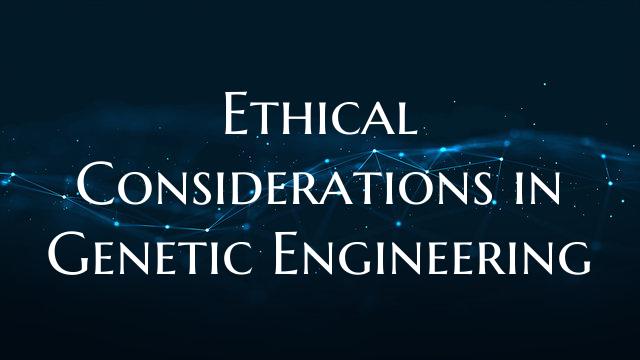Ethical Considerations in Genetic Engineering
Genetic engineering, the deliberate modification of an organism's genetic information using biotechnology, has the potential to revolutionize medicine, agriculture, and various industries. While the advancements in genetic engineering hold enormous promise, they also raise a host of ethical considerations that must be carefully weighed and navigated.
One of the primary ethical concerns surrounding genetic engineering is the issue of informed consent. When genetic manipulation is applied to humans, such as in gene therapy or embryonic editing, it becomes crucial to ensure that individuals fully understand the risks, benefits, and implications of such interventions. Consent must be freely given without coercion, and individuals should have the autonomy to make decisions about their own genetic information.
Another significant ethical consideration is the potential for genetic engineering to exacerbate existing social inequalities. Access to genetic technologies and treatments may be limited by factors such as socioeconomic status, creating disparities in healthcare and widening the gap between the privileged and the marginalized. It is essential to address these disparities and ensure equitable access to genetic advancements for all members of society.
Furthermore, ethical dilemmas arise in the realm of germline editing, where changes made to an individual's genetic material can be passed down to future generations. This raises concerns about the unintended consequences and long-term implications of genetic modifications, as well as the ethical responsibility of individuals to consider the impact of their genetic choices on future generations.
In agriculture, the use of genetically modified organisms (GMOs) raises ethical concerns related to environmental sustainability, food safety, and the rights of farmers and consumers. The potential for GMOs to create unintended environmental consequences or to concentrate power in the hands of a few agricultural corporations underscores the importance of ethical oversight in genetic engineering practices.
Additionally, ethical considerations in genetic engineering extend to issues of privacy and data security. As genetic information becomes increasingly digitized and accessible, concerns about the misuse of genetic data, discrimination based on genetic profiles, and the protection of individual privacy rights become paramount.
In navigating the complex landscape of genetic engineering, it is essential for scientists, policymakers, ethicists, and the public to engage in open dialogue, ethical reflection, and robust regulation. By prioritizing transparency, accountability, and respect for human dignity, we can harness the potential of genetic engineering while upholding ethical principles and safeguarding the well-being of individuals and society as a whole.

